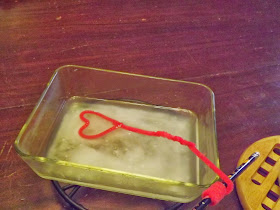Add a little science to your Valentine’s Day activities with
these old-school crystal hearts. Asking what-if questions and setting this
activity up as a series of experiments will enhance both your “send home”
Valentines and your science center.
For each crystal heart you wish to make, you need:
Attach a second pipe cleaner to the tail of the first so
that the heart can dangle in the jar.
Attach the end of the second pipe cleaner to a pencil by
simply wrapping it around until you have the correct length. This took a little
experimenting and trial and error of my own! The heart needs to be suspended in
the jar and not touch the bottom.
Children can measure out the Borax with appropriate
supervision.
Pour Borax into jar (1/2 to ¾ cup).
Pour Borax into jar (1/2 to ¾ cup).
Adults only should pour boiling water into jar to at least
the 3 cup mark. NOTE: If you are using glass container less thick than a Mason
jar or a pyrex dish, you need to warm the jar in the oven or dishwasher prior
to pouring boiling water into it to avoid breaking the glass.
Stir the solution to help the Borax dissolve.
Suspend the heart in the solution.
Let the predictions begin!!!
Ask children questions and write down their answers. You may
want to get a kitchen timer and use it to help children remember to check on
their hearts. Children can take turns being the observer/recorder as well.
How
long do you think it will take for the crystals to form?
What
size crystals do you think will be made?
Where
are the crystals going to form? (On the pipe cleaner in the water? Above the
water? On the jar?)
Make
timed observations and help children record their observations.
Discuss
your results and talk about why the crystals formed, how they formed, etc.
Create alternative experiments generated by what if
questions such as what if we just soak the pipe cleaner in Borax solution and
hang it to dry? Will crystals form? Will they form just like those in the jar
with the solution?
To explore this alternative hypothesis, dissolve the Borax
in a shallow dish.
Swish a pipe cleaner heart in the solution.
Suspend the wet heart in a jar with no solution.
Ask questions, observe, record, discuss.
What if we used salt instead of Borax? Repeat steps above
substituting salt for Borax. And on, and on, and on! Follow the lead the
children take by supporting their curiosity (inquiry), and create opportunities
for them to experience different results based on their suggestions and
questions. Use prompts when needed.
I highly recommend creating a word wall as well. Here are
some words to start with:
Hypothesis
Experiment
Explore
Curious
Inquire
Solution
Crystal
If you make one crystal heart per child, these could be the
gifts sent home for moms for Valentine’s Day. I suggest that you also keep one
for the science center for further experimenting. What if we left the heart in
the solution overnight? What happens when the crystals dry out? How long will they last?
 Dr. Ellaine B. Miller, PhD, is the Managing Director for the Family Child Care Partnerships program at Auburn University. www.humsci.auburn.edu/fccp
Dr. Ellaine B. Miller, PhD, is the Managing Director for the Family Child Care Partnerships program at Auburn University. www.humsci.auburn.edu/fccp
























No comments:
Post a Comment
We would love to hear from you! Please feel free to leave a comment below....